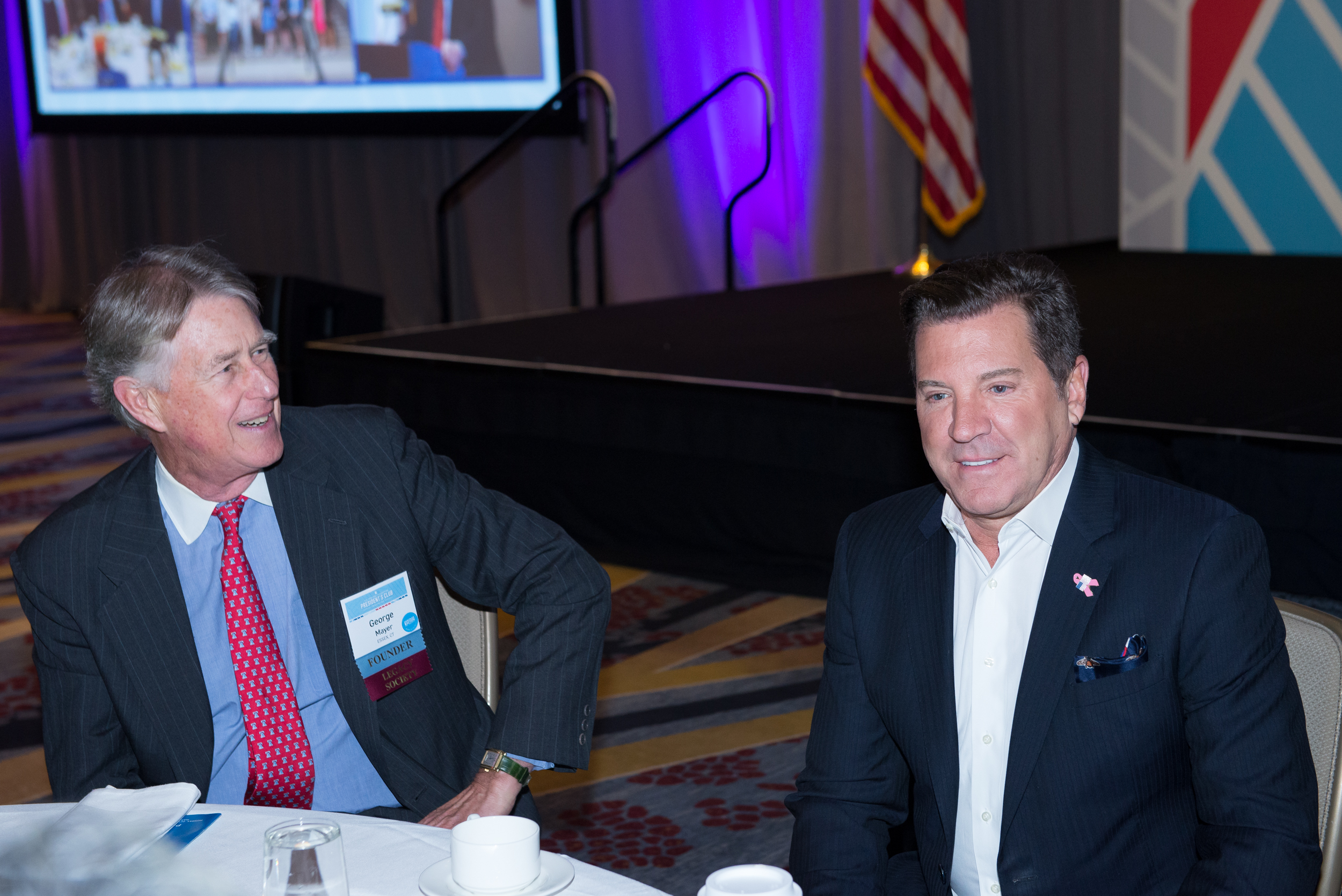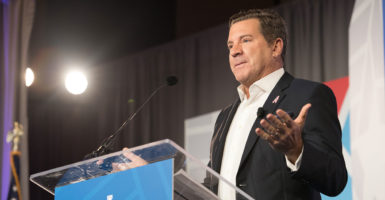CRTV host and author Eric Bolling recently spoke to The Daily Signal about socialism, the Trump economy, media bias, and the demise of “Never Trump” Republicans. This is a lightly edited transcript of that interview. You can listen to audio of the interview on our podcast.
Ginny Montalbano: Eric Bolling, thanks for joining The Daily Signal. You’re a man of many talents. You’re a former baseball player, commodities trader, TV host. In many ways you’re an example of the American dream. Tell our listeners what drives you.
Eric Bolling: I think that’s it. I came from a very, very lower class, not even lower middle, it was lower class humble beginnings in Chicago in the city. It was tough.
I remember a day where my mom, I couldn’t have been more than 7 or 8 years old, we went to a place called Valueville in Chicago, which is like a little mini-department store, kind of Kmart before Kmart. She’s like, “Let’s go get some sneakers.” I went and I got Pro-Keds.
I’ll never forget the look on her face when she told me we couldn’t afford the Pro-Keds. That was my first exposure to the classes. We didn’t have what other people had, because all my friends had Pro-Keds. I think that was really the beginning of a drive to want to succeed.
It’s kind of stayed with me from that day forward. I just went from baseball, which I would never have been able to afford college if it wasn’t for baseball. Baseball to my trading career, and then now into TV. Then I wrote a couple of books on the way, so it’s a drive that started very young. That’s what motivates me to continue.
Rob Bluey: Eric, you launched your show on CRTV on July 4th of this year. It’s called America. Tell us how it’s going in the past few months.
Bolling: By the way, we launched it on the rooftop of Heritage. It’s been amazing. We’re four months and a week into it and it’s just doing great. People are loving it.
What we do is it’s almost like “Parts Unknown,” an Anthony Bourdain-type show for politics in D.C. We’re going into Congress people, congressmen and women and senator’s offices. We’ll go and just talk to them about the topics of the day. We’ll go on the Supreme Court and Kavanaugh. I would spend time in the middle of all the protests.
I go around in D.C. with whatever the topic of the day is and just talk to people about what’s happening. Also mixing in Trump administration officials to get their side of the story.
It’s really been kind of fascinating to see. It’s a new education for me, too, because it’s a digital show, and it’s completely … you program it completely differently than you would a cable news show. In cable news you have your captive audience.
They pay for cable, and all you’re trying to do is get someone from another channel to come over and watch your show. In digital, you literally have to get out there and show something different, new, and show value to get people to subscribe and come sign on to the show. It’s a new world, but it’s a lot of fun.
Bluey: How do they subscribe if they want to watch?
Bolling: It’s crtv.com/eric. Thank you.
Montalbano: Eric, former House speaker Nancy Pelosi says that if Democrats take control back of the house, they’re going to pursue campaign finance reform, gun background checks, protect “Dreamers,”essentially restrictions on the First and Second amendments, and amnesty. Is this what the American people really want?
Bolling: I don’t know what the American people really want. I know conservative Americans don’t want that. Boy, you hear her. I read those comments. It’s literally, this whole socialism narrative is exploding. As I said in the remarks earlier inside, what happened in the last 10, 15 years?
When I first came into the media, socialism was a bad word. It was awful. I mean I remember saying Obama’s a socialist, and I got called to the office saying, “Be careful what you say. That’s pretty rough language.” Now Democrats are running as Democrat socialists. I don’t know how we’ve made such a fast move. Maybe people just like free stuff and they’re not concerned.
It’s possible that we’ve spent 10 or 15 or 20 years with decent or pretty good economies where younger people are saying, “Well, how bad could it possibly be? It could never have been as bad as it was.”
Meanwhile, I lived through the first crash in 1989, I lived through the 2005 financial crisis that almost wiped us out completely, the global financial markets. I see where younger people are saying, “Hey, maybe this is the place to go. I can get free stuff.”
I think there’s an opportunity to kind of show them that it’s not always going to be this way. There are risks to giving away everything, and one day you’re going to have to pay taxes and pay for all that stuff anyways, so someone’s going to have to pay. There’s an opportunity to pick up Republican, conservative young people.
"When I first came into the media, socialism was a bad word."
.@EricBolling sits down with @RobertBluey & I—stay tuned for the full interview out Monday via @DailySignal pic.twitter.com/0X7hw6f9ia
— Ginny Montalbano (@GinnyMontalbano) October 18, 2018
Bluey: I’m glad you raised that issue. We talked to Education Secretary Betsy DeVos here at The Daily Signal and asked her … what she’s observing and why young people are gravitating toward socialism. She said it’s because they’re really not getting that basic, foundational education about civics and government in K-12, and when they go to college, they’re not able to debate with professors who are obviously coming from a socialist perspective. Are there other factors why both young people and Democrats are moving in this direction?
Bolling: I don’t know if they totally are. I think on the coasts they are, and I think they tend to be the more high profile candidates and/or elected officials. I think the general … it’s said when you travel the middle part of the country, even the South, the West, central, it’s not like that. It’s still center/right. They’re still pro-Trump and they’re still generally conservative. It’s just that there are pockets of populations on the coasts that lean far left. They’re just liberals/socialists that they’re looking for.
I just talked to a gentleman inside who said, you know, “Oklahoma, the reddest state in the union.” I said, “Well, yeah? There’s a lot of red states.” He said, “We were the only state that had not one county that voted for Hillary Clinton. They were all Trump voters. They all went Trump.”
When you look at middle America, if you look at that county map, with the red versus blue in the counties, it’s crazy. It’s like 90 percent of the counties, or 80-something percent of the counties voted Trump, not Hillary. You know, look, the system is set up that it’s population-driven. I get it, but that’s what happens. The media centers are on the east coast and the west coast, and those are the ones that are getting the most attention. They’re all liberal.

Eric Bolling, host of the CRTV show “America,” speaks at The Heritage Foundation’s annual President’s Club meeting Oct. 16. (Photo: Erin Granzow for The Daily Signal)
Montalbano: From your recent travels, from your show, which issues would you say are conservatives most fired up about right now?
Bolling: Well, I mean I’ll go to events and it’s the wall. I actually think they’re not fired up enough about the mid-term elections. I think they are more fired up than they would have been if Brett Kavanaugh didn’t get seated. I think they’ll show up.
Like I said inside, I think the Senate may pick up one or two Senate seats, which, contrary to what the liberal media will tell you, that it’s going to be Democrats picking up seats, I doubt it. I think it’s Republicans. I also think that Republicans hold the House, too, but I think there needs to be a little bit more energy. Let’s get out there.
Bluey: Certainly the economy is doing very well, and that could fuel some people who like the Trump administration’s policies. What do you attribute the success to that we’ve seen in the last two years?
Bolling: I’ve got to tell you, the first thing Trump did when he got into office, he was already rolling back regulation. Literally starting to roll back regulation after regulation. That frees up the business community. I can’t emphasize enough how businesses, board rooms, and I’ve been on the board of directors of the New York Mercantile Exchange.
I spent five years on there and you have a business outlook going forward a year, a five year and a ten year plan. When the environment is so regulatory overblown, strangling your business, you don’t plan too far ahead. You don’t hire as many people as you look to hire, or spend money on your own business.
When those regulations come down, where you’re feeling a little bit better about being able to expand into a new area of business, or you spend more money on research and development, on capital investment in your own company, and then finally hiring.
That all works its way into the system on unemployment. When people are employed, they spend more. That’s just the way it is. In the economy when unemployment is falling, it’s more spending and what that does is it raises GDP.
Like I said earlier, when was the last time we had GDP exceeding the unemployment rate by this much and for this long? Let’s not forget three years ago, Obama said 1.5 percent GDP was going to be the new norm. The new norm. Now we’re in excess of 4 percent, in excess of 3 percent for several quarters. It wasn’t the new norm. It was just him explaining why he was 1.5 percent for eight years.
Montalbano: You mentioned Brett Kavanaugh earlier. What do you think the lasting impact of that entire ordeal will be?
Bolling: A Supreme Court that’s conservative for 30 years, 20, 30 years plus, and I think the Kavanaugh issue becomes boring. Liberals will look for the next thing to complain about. If you remember, it was Russia collusion. All of a sudden Kavanaugh got everyone’s attention, and then that went away.
Pretty soon it’s going to be back to Russian collusion. They’ll forget about Kavanaugh until the first major major line in the sand conservative/liberal decision at the Supreme Court, and then they’ll say, “Oh, it should be thrown out because of what’s going on,”, the nonsense that’s gone on the last couple of months.
Bluey: Eric, Gallup has a new poll out. It shows trust in media among Republicans is just 21 percent. Contrast that with Democrats where it’s 76 percent of Democrats trust the media. What does this tell us about the state of our media in our country?
Bolling: It tells you that Trump is right, that the media is wildly biased towards the left, on the left, and against Donald Trump. There’s no question about it. You saw these Harvard studies about how much negative attention, negative stories about Trump versus positive, like 80 percent, and how many people in media donate to Democrat causes versus Republican.
It’s 80 percent, 90 percent. The media clearly is left. Of course Republicans aren’t going to trust them. Generally they’re liberal. There are very, very few conservatives, and probably fewer fair, down the middle media types. Even the news people, who are supposed to be straight down the middle, aren’t. They pick a side. Generally the sway is that far.
Montalbano: I wanted to ask you next, what do you think has happened to the never-Trump Republicans? President Trump has had so many wins. Do you think any of them have been swayed at all?
Bolling: I think Never Trumpers are on a slow path to destruction. The Never Trumpers were more dangerous than the liberals. You knew where the left was on Trump, but the Never Trump crew was undermining him. It was awful. When you have a Republican taking shots and undermining the Trump agenda, it was awful, terrible.
I talked about, for example, John McCain, Jeff Flake and Lindsey Graham, Ben Sasse, among others, were probably four of the most vocal Never Trump Republican senators. I talked about running against Lindsey Graham. I bought a house in South Carolina to primary Lindsey Graham, and I was going to do it up until the Kavanaugh hearings and he found his voice.
Now, did he find his voice after McCain passed? Perhaps. Maybe he just didn’t have it in him to have that voice when John McCain, his very, very good friend, was here to keep an eye on him.
I think slowly, and I saw Ben Sasse this morning on MSNBC, and he was almost pro-Trump. Not quite pro-Trump, but not taking shots at the president any more. These are people who were really detrimental, hurtful to the president and his candidate, his presidency and his agenda, and now seem to be realizing that hey, how do you argue with 4-plus percent GDP and under 4 percent unemployment? You don’t.
Don’t go back to your districts or your states and try and run against that. It’s political suicide. I think the Never Trump portion of the swamp is draining itself.

“I think “Never Trumpers” are on a slow path to destruction,” says Eric Bolling. (Photo: Erin Granzow for The Daily Signal)
Bluey: Ginny mentioned earlier your many talents. Is politician in the future, then?
Bolling: It was. It was very close. If, like I said, I’m very serious. I bought the house with the express purpose of running in 2020, primarying Lindsey Graham, until he was so vocal and so influential in making sure Brett Kavanaugh got seated.
During the campaign for presidency, I would continually implore people, conservatives, to vote for Trump, who couldn’t stand him. Just vote for him because you needed a conservative Supreme Court. It will out-last the Trump legacy by decades. The Supreme Court was the most important thing for me.
Trump’s my friend. I thought he would be a good businessman, and I thought the economy would do well, but for me the most important reason to vote for Trump was the Supreme Court.
He was the only one that was going to beat Hillary, and we needed conservatives on the Supreme Court. When Lindsey Graham stepped up and put it out there, put it all on the line, I was like, “You know? Maybe I won’t.”
By the way, he is not the most loved senator in the union. I mean you travel South Carolina, they don’t really love him that much. I think he re-earned his political, his conservative credentials in the Kavanaugh hearing, so I decided to, let’s do something else.
Montalbano: Congress recently passed a bipartisan opioids bill. I know it’s an issue that’s very close to your heart following your son’s death. Do you think that we’re making progress on this issue?
Bolling: We are. Not enough, but we are. I think we made a lot of progress, and I think Trump wants to do a lot of interesting things on the enforcement side, with the drug dealers, closing the border to illegal drugs coming across. Kirstjen Nielsen at Homeland Security is doing some things with the postal service to catch opioids as they come, and other drugs as they come. The enforcement side’s doing real well.
I’m very vocal about saying the administration needs some help on the awareness side. Young people need to realize how dangerous drugs are. My son passed from an accidental overdose of illegal fentanyl in a Xanax tablet that he bought on campus. I think young people need to understand how dangerous they are. We need more of that. We need more PSAs on television.
We need more people talking about it. Parents need to understand that it’s a conversation you have to have. Really we need to remove the stigma of opioids. People think heroin and they think needles and veins in dark alleys. It’s not that anymore.
It’s literally tablets on the street that are $5 or $10 that high schoolers are buying to get high. It’s cheaper than marijuana or cocaine, and some of it’s bad. Some of it’s deadly. 74,000 people died last year, and the number’s going up, not down. There needs to be more enforcement, but much more awareness.
Attending the Opioid Bill signing with @realDonaldTrump and @FLOTUS at the White House East Wing. pic.twitter.com/jQdN19xYYg
— Eric Bolling?? (@ericbolling) October 24, 2018
Bluey: We appreciate the work that you’re doing to help raise some of that awareness. I know you’ve appeared in some of those White House videos to help raise awareness about the issue.
Bolling: It’s not easy. These questions are hard, but they need to be spoken about, need to be answered. We’ll continue that path as well.
Montalbano: Eric, thank you so much for joining us again at The Daily Signal.
Bolling: Thank you, guys. Thank you guys, both, so much. I appreciate it. Any time, by the way.



























